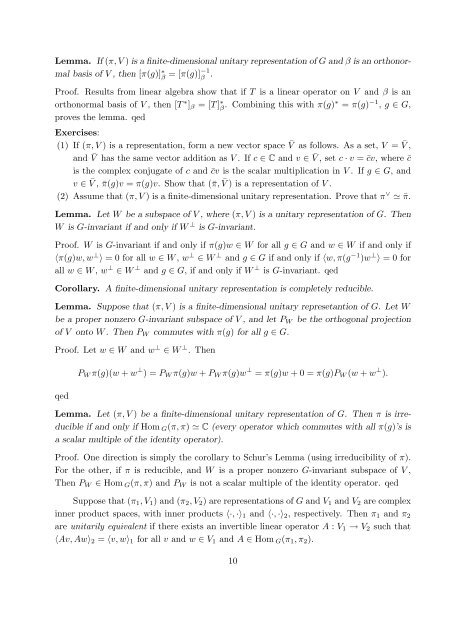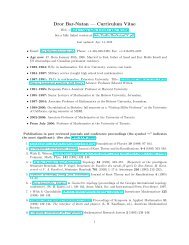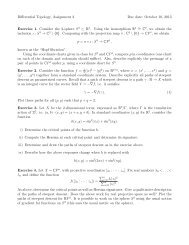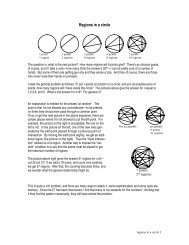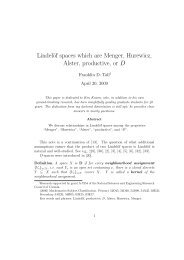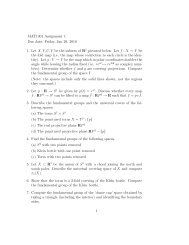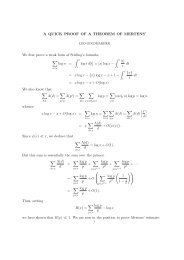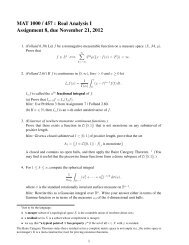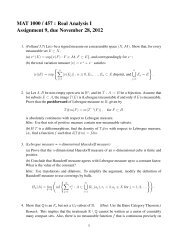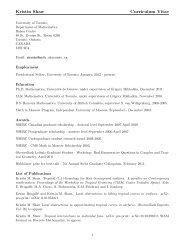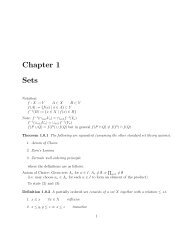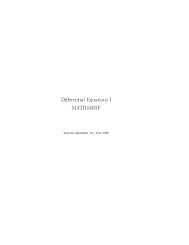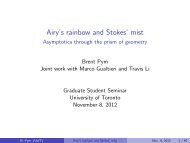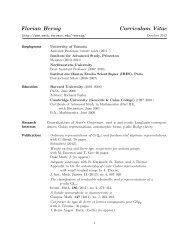MAT 445/1196 - INTRODUCTION TO REPRESENTATION THEORY ...
MAT 445/1196 - INTRODUCTION TO REPRESENTATION THEORY ...
MAT 445/1196 - INTRODUCTION TO REPRESENTATION THEORY ...
You also want an ePaper? Increase the reach of your titles
YUMPU automatically turns print PDFs into web optimized ePapers that Google loves.
Lemma. If (π, V ) is a finite-dimensional unitary representation of G and β is an orthonormal<br />
basis of V , then [π(g)] ∗ β = [π(g)]−1 β .<br />
Proof. Results from linear algebra show that if T is a linear operator on V and β is an<br />
orthonormal basis of V , then [T ∗ ]β = [T ] ∗ β . Combining this with π(g)∗ = π(g) −1 , g ∈ G,<br />
proves the lemma. qed<br />
Exercises:<br />
(1) If (π, V ) is a representation, form a new vector space ¯ V as follows. As a set, V = ¯ V ,<br />
and ¯ V has the same vector addition as V . If c ∈ C and v ∈ ¯ V , set c · v = ¯cv, where ¯c<br />
is the complex conjugate of c and ¯cv is the scalar multiplication in V . If g ∈ G, and<br />
v ∈ ¯ V , ¯π(g)v = π(g)v. Show that (¯π, ¯ V ) is a representation of V .<br />
(2) Assume that (π, V ) is a finite-dimensional unitary representation. Prove that π ∨ ¯π.<br />
Lemma. Let W be a subspace of V , where (π, V ) is a unitary representation of G. Then<br />
W is G-invariant if and only if W ⊥ is G-invariant.<br />
Proof. W is G-invariant if and only if π(g)w ∈ W for all g ∈ G and w ∈ W if and only if<br />
〈π(g)w, w ⊥ 〉 = 0 for all w ∈ W , w ⊥ ∈ W ⊥ and g ∈ G if and only if 〈w, π(g −1 )w ⊥ 〉 = 0 for<br />
all w ∈ W , w ⊥ ∈ W ⊥ and g ∈ G, if and only if W ⊥ is G-invariant. qed<br />
Corollary. A finite-dimensional unitary representation is completely reducible.<br />
Lemma. Suppose that (π, V ) is a finite-dimensional unitary represetantion of G. Let W<br />
be a proper nonzero G-invariant subspace of V , and let PW be the orthogonal projection<br />
of V onto W . Then PW commutes with π(g) for all g ∈ G.<br />
Proof. Let w ∈ W and w ⊥ ∈ W ⊥ . Then<br />
qed<br />
PW π(g)(w + w ⊥ ) = PW π(g)w + PW π(g)w ⊥ = π(g)w + 0 = π(g)PW (w + w ⊥ ).<br />
Lemma. Let (π, V ) be a finite-dimensional unitary representation of G. Then π is irreducible<br />
if and only if Hom G(π, π) C (every operator which commutes with all π(g)’s is<br />
a scalar multiple of the identity operator).<br />
Proof. One direction is simply the corollary to Schur’s Lemma (using irreducibility of π).<br />
For the other, if π is reducible, and W is a proper nonzero G-invariant subspace of V ,<br />
Then PW ∈ Hom G(π, π) and PW is not a scalar multiple of the identity operator. qed<br />
Suppose that (π1, V1) and (π2, V2) are representations of G and V1 and V2 are complex<br />
inner product spaces, with inner products 〈·, ·〉1 and 〈·, ·〉2, respectively. Then π1 and π2<br />
are unitarily equivalent if there exists an invertible linear operator A : V1 → V2 such that<br />
〈Av, Aw〉2 = 〈v, w〉1 for all v and w ∈ V1 and A ∈ Hom G(π1, π2).<br />
10


